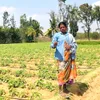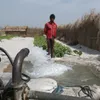This organisation is working with the government to provide relief in India's drought-hit areas
Bharatiya Jain Sanghatana’s Sujalam Suphalam initiative is improving water resources in rural areas by undertaking rejuvenation activities and watershed treatments.
Stretches of arid land, scarce water resources, and people lined up to get water – India is no stranger to droughts. And now, with the threat of climate change, conditions are not expected to improve.
According to a study by Drought Early Warning System (DEWS), more than 44 percent of the country witnessed various degrees of dry conditions as of June 10, 2019. Around 600 million people are still being affected.
The most distressed are farmers, who have to deal with crop failures, poor soil health, and low productivity. Their livelihoods are being threatened so severely that cases of suicide have gone up.
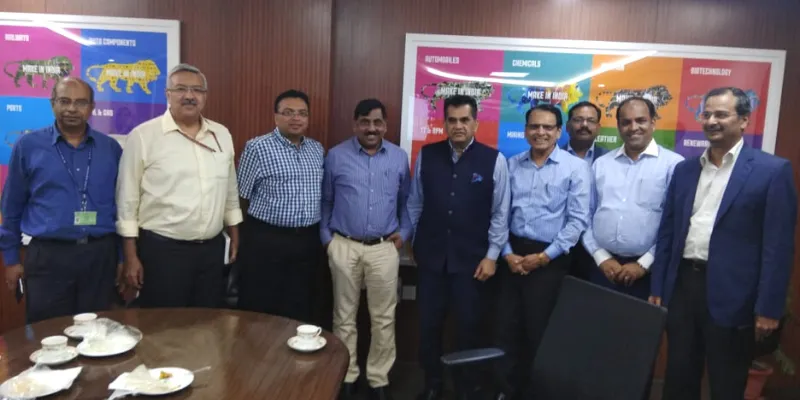
Amitabh Kant, CEO of NITI Aayog with Shantilal Muttha, Founder of BJS, and others from the Sujalam Suphalam team.
Both the central and the state governments have launched many programmes to mitigate the effects of droughts like the National Hydrology Project and the Pradhan Mantri Krishi Sinchayi Yojana (PMKSY). A dedicated ministry, Jal Shakti, was instituted in 2019 to conserve water and ensure equitable distribution of the resource.
Bharatiya Jain Sanghatana (BJS), a Pune-based NGO working in the field of water resource development since 2013, is collaborating with the government to expedite these endeavours.
Led by Shantilal Muttha, the organisation has designed and developed a district-wide model called ‘Sujalam Suphalam’, and is already implementing it across nine districts in Maharashtra and Karnataka.
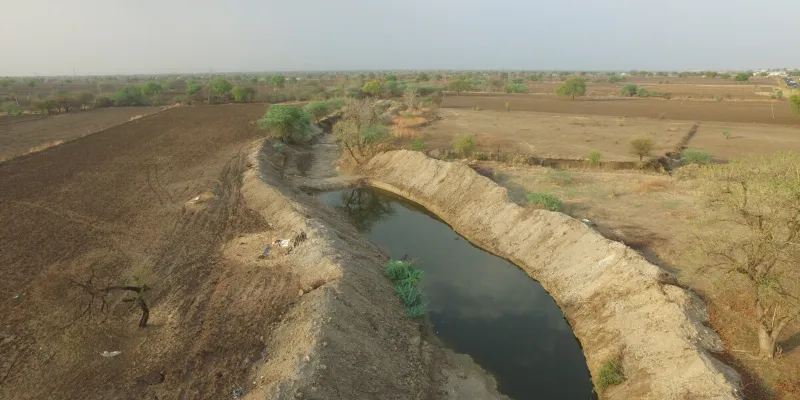
A feeder channel created as part of the Sujalam Suphalam initiative in the district of Akola.
“We focus on improving water resources in rural areas by undertaking rejuvenation activities and watershed treatments to boost groundwater levels. The programme brings together all the stakeholders – district administration, the farming community, NGOs, state governments, and the general public – to build community capacity for improved water management,” says Harish Pathak, CEO, Sujalam Suphalam.
The inception
Shantilal Muttha, the Founder of BJS, quit his flourishing real estate business in 1984 to get involved in social work. Born in Dongarkinhi, a small village in Maharashtra’s Beed district, Muttha very closely witnessed the inequality and exploitation of the marginalised at the hands of the rich. This influenced his outlook on life.
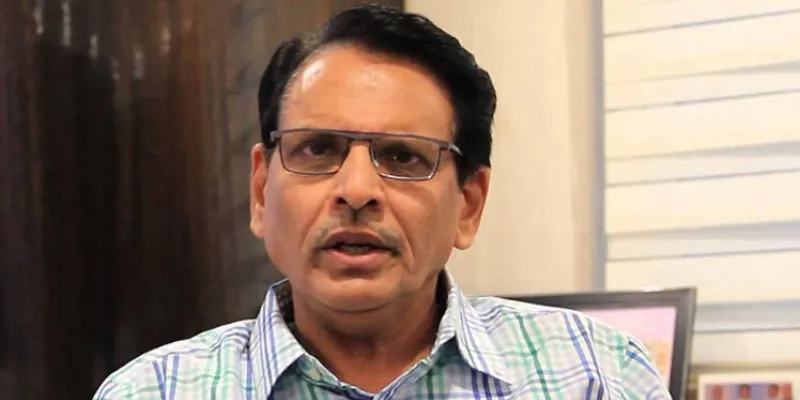
Shantilal Muttha, Founder, Bharatiya Jain Sanghatana.
He began working for the welfare of women, and raised his voice against archaic practices like dowry and female foeticide. Things took a sudden turn in 1993 when a 6.3 magnitude earthquake struck Latur, causing thousands of fatalities and rendering people homeless.
Witness to the helplessness of the quake victims, the then 39-year-old ventured into disaster relief and management for the very first time. It was during this time that BJS was registered as an NGO.
"Over the years, the organisation worked to address various socio-economic issues, at the policy level and on the ground. Muttha decided to act in 2013 when it came to light that more than 3,000 farmers had committed suicide in Maharashtra due to crop failure and drought. Sujalam Suphalam originated from there,” Harish explains.

The Tunapur lake in Raichur was desilted and rejuvenated as part of a Sujalam Suphalam initiative.
The first full-fledged drought relief project under the initiative was organised in Buldana, a district located in the Amravati division of Maharashtra, with financial assistance from Tata Trust. After the success of the programme, the state government proposed partnering with BJS to extend similar services to other drought-hit areas.
A collaborative effort to reduce water distress
The activities deployed as part of Sujalam Suphalam range from lake rejuvenation, watershed management, tank and drainage constructions, and earthwork for water extraction.
The programme is conceptualised in such a way that ownership lies in the hands of the district administration. However, BJS trains its staff to define the scope of work and assess the geography of water resources.
Subsequently, the administration appoints staff to work on the ground. After the project’s launch, committees are formed at the taluka level to oversee operations and check progress at regular intervals.
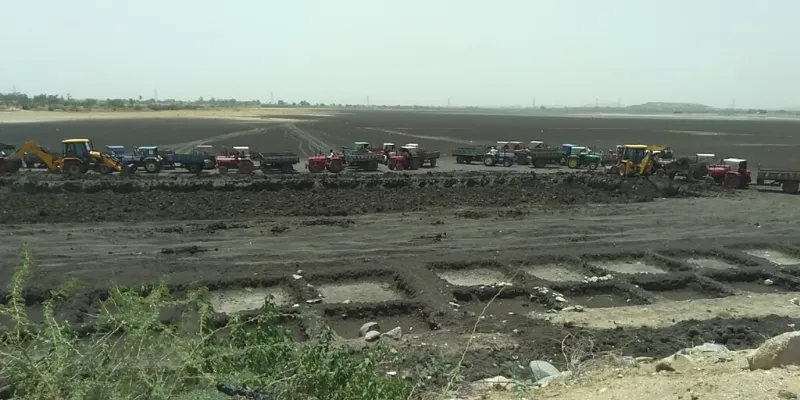
Farmers line up in trucks to pick up silt from Merched Lake in Raipur.
“The state government, on the other hand, helps to gain the attention of the community through adequate publicity. It also appoints a dedicated nodal authority for coordination and management of the programme. And, most importantly, the government takes care of budgetary requirements and implementation hurdles. In order to gauge the impact of the project, it appoints certain qualified officials to conduct periodic assessments,” says Sushanta Kumar Bhuyan, Project Director, Sujalam Suphalam.
BJS plays the role of a facilitator. The organisation holds community awareness sessions, sensitisation programmes, and workshops for farmers to educate them on efficient water utilisation practices.
The NGO also takes the responsibility to support the gram panchayat, district administration, and state government at every stage of the project.
Success stories
Sujalam Suphalam has worked in nine districts - Buldhana, Washim, Akola, Latur, Osmanabad, Ahmednagar in Maharashtra and Yadgir, Raichur, Shivamogga in Karnataka.
The impact that it has had on the land and its people is notable.
“We have observed significant transformations in all nine regions, starting from improved access to surface and groundwater resources, better fertility of farmlands, and stronger community-based actions for water resource development. Sujalam Suphalam is planning to expand the scale of the project to include other drought-struck districts of the country,” Sushanta says.
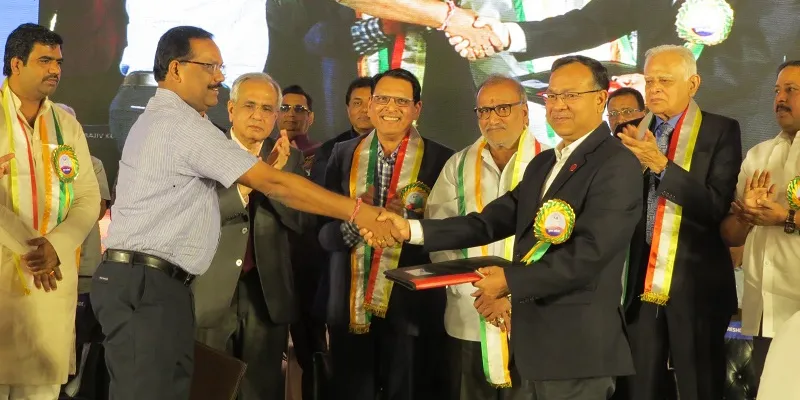
Government of Karnataka signing an MoU with BJS.
Chandpasha Patel is a farmer residing in Yadgir district of Karnataka. He has been practising agriculture for almost a decade now. When asked about Sujalam Suphalam, he said,
“Due to below-par rainfall, all my crops were drying up. I was extremely worried about my earnings too. But, last year, BJS, along with the district administration, initiated a programme here and rejuvenated a nearby lake. So I picked up all the silt that was collected and used it on my land. It helped the soil on my plot retain moisture and I am now able to produce a lot of vegetables, sorghum, and cotton.”
India’s acute water shortage has devastated the livelihoods of a lot of farmers over many years.
Sujalam Suphalam, through its water resource development models and sustainable practices, is trying to ensure the future looks different.
(Edited by Kanishk Singh)


